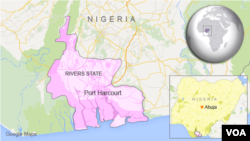The governor of Nigeria’s Rivers State is hoping an inquiry into violence that happened around this year’s presidential and governor elections will bring a measure of reconciliation to the oil-producing state. But the inquiry has been hamstrung by allegations of partisan bias.
Nigeria’s presidential and governor elections held this year were among the most peaceful since the country returned to democracy in 1999. But one of the places where violence did happen was in Rivers State, in the oil-producing Niger Delta region.
Assassinations and fighting broke out across the state around the time of the presidential and governor votes in March and April. At least six people were killed on the day governorship polls were held.
The state has set up a commission of inquiry to look into the violence. Godspower Igwe’s story was typical of those who testified to the inquiry commission. He said he and other supporters of one of Nigeria’s two major political parties, the All Progressives Congress, were beaten up on the day of the presidential election. He is hopeful the commission will heal the rifts in the state.
“It is the majority of Rivers people that want their conscience to be satiated, that wants their pain to be relieved. That pain will only be relieved, their conscience will only be satiated if the panel of inquiry does a thorough job,” he stated.
But Nigeria’s other major political party, the Peoples Democratic Party (PDP) is not participating. Emmah Okah is a spokesman for the party in Rivers State. He said the PDP does not trust the partiality of the panel, which was set up by outgoing state governor and APC firebrand Rotimi Amaechi. It is chaired by the head of the governing council of Nigeria’s Human Rights Commission, who Okah also accused of bias.
“It would be improper for a tribunal set up by a party to dispute who has already voiced his opinion, who has already condemned the other party, to now sit, and begin to take evidence,” added Okah.
Amaechi was the chairman of former military ruler Muhammadu Buhari’s successful campaign to win the March presidential vote. He unseated the PDP’s candidate, President Goodluck Jonathan, who came from Bayelsa, a state neighboring Rivers. Jonathan enjoys strong support in the Niger Delta region, and the PDP’s candidate ended up winning the April governor vote.
Anyakwee Nsirimovu is the executive director of the Institute of Human Rights and Humanitarian Law in the state capital Port Harcourt. He said this political dynamic combined with the state being a major source of the country’s oil wealth led to the election violence. Despite the controversy, the inquiry is the best way to deal with this legacy, he said.
“Every election you kill people, and you get into power, and nothing happens. And those who killed, believe that they can do it over and over again, and nothing will happen. For me, there has to be an end to this. And, if this is the beginning of that end, it's a welcome development,” said Nsirimovu.
But with a PDP governor taking off in next week’s change of power, what the end result of the commission work will be remains uncertain.
